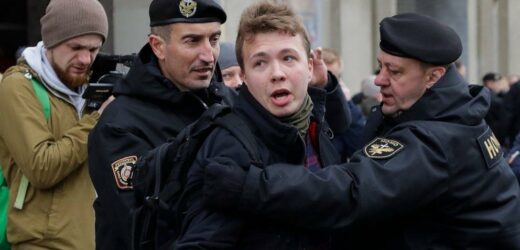BRUSSELS — Western outrage grew and the European Union threatened more sanctions Monday over the forced diversion of a plane to Belarus in order to arrest an opposition journalist. The dramatic gambit apparently ordered by the country’s authoritarian president to suppress dissent was denounced as piracy, a hijacking and terrorism.
Ryanair said Belarusian flight controllers told the crew there was a bomb threat against the plane as it was crossing through the country’s airspace and ordered it to land in the capital of Minsk. A Belarusian MiG-29 fighter jet was scrambled to escort the plane — in a brazen show of force by President Alexander Lukashenko, who has ruled with an iron fist for over a quarter-century.
The goal was seemingly the arrest of Raman Pratasevich, a 26-year-old activist and journalist who ran a popular messaging app that played a key role in helping organize massive protests against the authoritarian leader. He and his Russian girlfriend were led off the plane shortly after landing — and authorities haven’t said where they’re being held. The plane, which began its journey in Athens, Greece, was eventually allowed to continue on to Vilnius, Lithuania.
U.S. Secretary of State Antony Blinken called the diversion “shocking” and appealed for Pratasevich’s release. EU leaders were particularly forceful in their condemnation of the arrest and move against the plane, which was flying between two of the bloc’s member nations and was being operated by an airline based in Ireland, also a member.
The bloc summoned Belarus’ ambassador “to condemn the inadmissible step of the Belarusian authorities” and said in a statement the arrest was yet again “another blatant attempt to silence all opposition voices in the country.”
Irish Prime Minister Micheal Martin told broadcaster RTE that the episode “reflects growing authoritarianism across the world.”
“These authoritarian figures taking pre-meditated decisions of this kind. … We have to respond very strongly to it,” he said.
EU Commission President Ursula von der Leyen earlier said it amounted to a “hijacking,” while Lithuanian President Gitanas Nauseda called it a “state-sponsored terror act.”
EU leaders have tried to bring Belarus closer to the bloc — to encourage democratic reforms and reduce the influence of Russia — but they have failed so far. On Monday, hours ahead of a previously planned summit, some EU leaders were threatening more sanctions — from scrapping landing rights in the bloc for Belarus’ national airline to exclusions from sporting events.
The U.S. and the EU already have imposed sanctions on top Belarusian officials amid months of protests, which were triggered by Lukashenko’s reelection to a sixth presidential term in an August vote that the opposition rejected as rigged. More than 34,000 people have been arrested in Belarus since then, and thousands were brutally beaten.
The Belarusian Foreign Ministry on Monday bristled at what it described as “belligerent” EU statements, insisting that the country’s authorities acted “in full conformity with international rules.”
Amid the tensions, Lufthansa said that a flight from Minsk to Frankfurt with 51 people on board was delayed Monday following a “security warning.” It was eventually allowed to depart with all passengers on board after the authorities searched the plane, put the passengers through another security check and unloaded all luggage and freight.
Flight tracker sites indicated the plane was about 10 kilometers (six miles) from the Lithuanian border when it was diverted. There have been conflicting reports of what exactly happened.
The press service of Lukashenko said the president himself ordered that a fighter jet accompany the plane after he was informed of the bomb threat. Deputy air force commander Andrei Gurtsevich told Belarusian state TV that the plane’s crew made the decision to land in Minsk, adding that the fighter jet was sent to “provide help to the civilian aircraft to ensure a safe landing.”
But Ryanair said in a statement that Belarusian air traffic control instructed the plane to divert to the capital. The plane was searched, and no bomb was found.
Ryanair’s CEO Michael O’Leary described the move as “a case of state-sponsored hijacking … state-sponsored piracy.”
”It’s very frightening for the crew, for the passengers who were held under armed guard, had their bags searched,” he told the Irish radio station Newstalk.
In an apparent reference to the Belarusian security agency that still goes under its Soviet-era name KGB, O’Leary said he believes “some KGB agents offloaded from the aircraft” in Minsk.
Passengers described Pratasevich’s shock when he realized that the plane was going to land in Minsk.
“I saw this Belarusian guy with girlfriend sitting right behind us. He freaked out when the pilot said the plane is diverted to Minsk. He said there’s death penalty awaiting him there,” passenger Marius Rutkauskas said after the plane finally arrived in Vilnius. “We sat for an hour after the landing. Then they started releasing passengers and took those two. We did not see them again.”
Pratasevich was a co-founder of the Telegram messaging app’s Nexta channel, which played a prominent role in helping organize major protests against Lukashenko.
Nearly 2 million Belarusians in the nation of 9.3-million people have followed the channel, which has served as the main conduit for organizing demonstrations and offered advice on how to dodge police cordons. It also has run photos, video and other materials documenting the brutal police crackdown on the protests.
The Belarusian authorities have labeled the channel “extremist” and leveled charges against Pratasevich of inciting mass riots and fanning social hatred. He could face 15 years in prison if convicted.
Agnes Callamard, the secretary-general of Amnesty International, called his arrest arbitrary and said that the implications for dissidents were alarming.
“This is how far #Belarus is prepared to go in its repression,” she wrote in a tweet. “The int’l community must react in the strongest possible way to ensure such act of air piracy, to silence dissenting voices, is never repeated.”
Kremlin spokesman Dmitry Peskov wouldn’t say if the Belarusian authorities had contacted Russia about the episode. The two neighbors have close political, economic and military ties, and Lukashenko has relied on Moscow’s support amid Western sanctions.
Russian Foreign Minister Sergey Lavrov quickly offered a helping hand to Belarus, saying that the episode needs to be investigated — but that it couldn’t be rushed — and hailing the Belarusian authorities’ promise to run a transparent probe.
Lavrov said Moscow will request consular access to Pratasevich’s girlfriend, Sofia Sapega, who is a student at a university in Vilnius.
———
Isachenkov reported from Moscow. Associated Press writers Liudas Dapkus in Vilnius, Lithuania, Sam Petrequin in Brussels, Sylvia Hui in London and Geir Moulson in Berlin contributed to this report.
Source: Read Full Article


